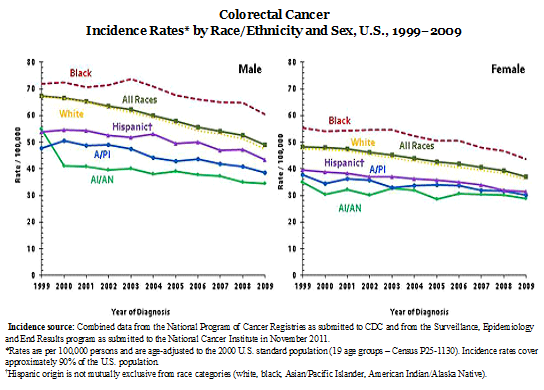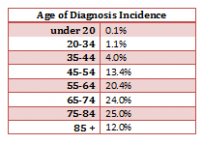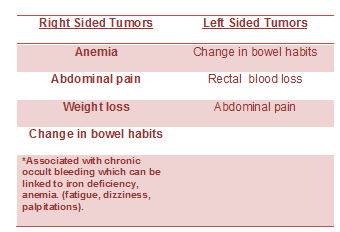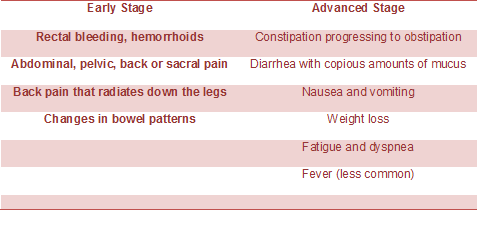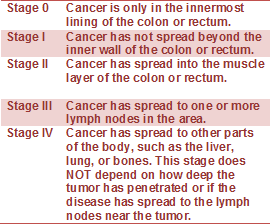Colorectal Cancer
Original Editors - Jacqueline Lopez & Abby Schnur from Bellarmine University's Pathophysiology of Complex Patient Problems project.
Lead Editors - Your name will be added here if you are a lead editor on this page. Read more.
Definition/Description[edit | edit source]
Colorectal cancer (CRC) is a rapid abnormal cell growth that affects the large intestines and/or rectum. These clusters of cells are called adenomatous polyps and develop from the tissue membrane of glandular tissue. Polyps can start as benign and non-cancerous but with time can develop and become cancerous.
Prevalence
[edit | edit source]
Colorectal cancer is the second leading cause of death from a type of cancer in the United States. It is also the third most common cancer among men and women. The most current statistics report 136,717 people were diagnosed in 2009 with colorectal cancer (51.26% male and 48.63% female) and 51,848 deaths (51.7% male and 48.3% female) according to the Center of Disease Control.
Data from 2009 provided by the National Cancer Institute showed that prior to January 1, 2009 1,140,161 people were living with a diagnosis of CRC in the United States. This number includes people both, currently seeking treatment for their active diagnosis, as well as, individuals who have been in years of remission. 558,648 of these individuals were male and 581,477 were female.
Other statistical facts gathered from various sources include the following:
- The lifetime risk of developing CRC is 1/20 or 4.96%. http://www.cancer.org/cancer/colonandrectumcancer/overviewguide/colorectal-cancer-overview-key-statistics
- The mean age of CRC diagnosis is 69 years of age. http://seer.cancer.gov/statfacts/html/colorect.html
- The mean mortality age of CRC is 74 years of age. http://seer.cancer.gov/statfacts/html/colorect.html
- Studies between 1991 and 2005 show that survival rates from CRC have increased by 30%. http://www.cancercare.org/publications/28-medical_update_on_colorectal_cancer_understanding_kras
- The risk of getting CRC increases with age and is greater in men than women. http://www.cdc.gov/cancer/colorectal/statistics/age.htm
- The most common area of diagnosis is the rectum and the rectosigmoid junction, with the sigmoid resulting the most favorable outcome.
Characteristics/Clinical Presentation[edit | edit source]
Colorectal cancer can present as asymptomatic and symptomatic. Asymptomatic patients are diagnosed with a fecal occult blood test are identified at an early stage and most commonly located in the cecum/ascending colon.
Symptoms differ depending on where the tumor is located.
A diagnosis is made by a Colorectal Cancer screening examination or through an evaluation for an unrelated illness.
Associated Co-morbidities[edit | edit source]
add text here
Medications[edit | edit source]
Chemotherapy
Targeted Drug Therapy
Monoclonal antibody therapy: proteins engineered to help the body’s natural immune system to attack and destroy colorectal cancer cells. It can be used independently or with other chemotherapy treatment.
Radiation Therapy: helps to destroy cancer cells and can be used in conjunction with chemotherapy.
Radiation options:
Intensity Modulated Radiation Therapy (IMRT)
Intraoperative Radiation Therapy (IORT)
CyberKnife®
TheraShpere®
TomoTherapy®
Trilogy™
Diagnostic Tests/Lab Tests/Lab Values[edit | edit source]
add text here
Etiology/Causes[edit | edit source]
add text here
Systemic Involvement[edit | edit source]
add text here
Medical Management (current best evidence)[edit | edit source]
Staging of Colorectal Cancer
If cancer is detected, it will be "staged," a process of finding out how far the cancer has spread. Tumor size may not correlate with the stage of cancer. Staging also enables your doctor to determine what type of treatment you will receive.
Physical Therapy Management (current best evidence)[edit | edit source]
add text here
Alternative/Holistic Management (current best evidence)[edit | edit source]
add text here
Differential Diagnosis[edit | edit source]
add text here
Case Reports/ Case Studies[edit | edit source]
add links to case studies here (case studies should be added on new pages using the case study template)
Resources
[edit | edit source]
Recent Related Research (from Pubmed)[edit | edit source]
see tutorial on Adding PubMed Feed
Failed to load RSS feed from http://eutils.ncbi.nlm.nih.gov/entrez/eutils/erss.cgi?rss_guid=1NGmwZeh8JwVIzrKgHG1LrDm0izTr7ViJiDkSYAY2BW5hiXsx0|charset=UTF-8|short|max=10: Error parsing XML for RSS
References[edit | edit source]
- ↑ Colorectal (Colon) Cancer [Internet]. Center for Disease Control. 2012 [updated 2012 Oct 22]. Available from: http://www.cdc.gov/cancer/colorectal/index.htm.
- ↑ Seer Stat Facts Sheets: Colon and Rectum [Internet]. National Cancer Institute. 2012 [updated 2011 Nov]. Available from: http://seer.cancer.gov/statfacts/html/colorect.html.
- ↑ Colorectal Cancer Overview [Internet]. American Cancer Society. 2013 [updated 2013 Jan 17]. Available from: http://www.cancer.org/cancer/colonandrectumcancer/overviewguide/colorectal-cancer-overview-key-statistics.
- ↑ Enzinger PC, Benson AB, Mitchell EP, et al. Medical Update on Colorectal Cancer Understanding KRAS [pamphlet]. New York: Elsevier Oncology; 2010.
- ↑ Colorectal Cancer: Integrative Treatment Program [Internet]. Cancer Treatment Centers of America. 2012. Available from: http://www.cancercenter.com/colorectal-cancer.cfm.
- ↑ Tidy, Colin MD. Colorectal Cancer [Internet]. Patient.co.uk; 2012 [updated 2012 July 19]. Available from: http://www.patient.co.uk/doctor/colorectal-adenocarcinoma.htm.
- ↑ Cancer, Colon [Internet]. MDGuidlines. 2012. Available from: http://www.mdguidelines.com/cancer-colon.
- ↑ Colorectal Cancer [Internet]. BMJ Publishing Group. 2011 [updated 2013 Feb 4]. Available from: http://bestpractice.bmj.com/best-practice/monograph/258/diagnosis/differential.html.
